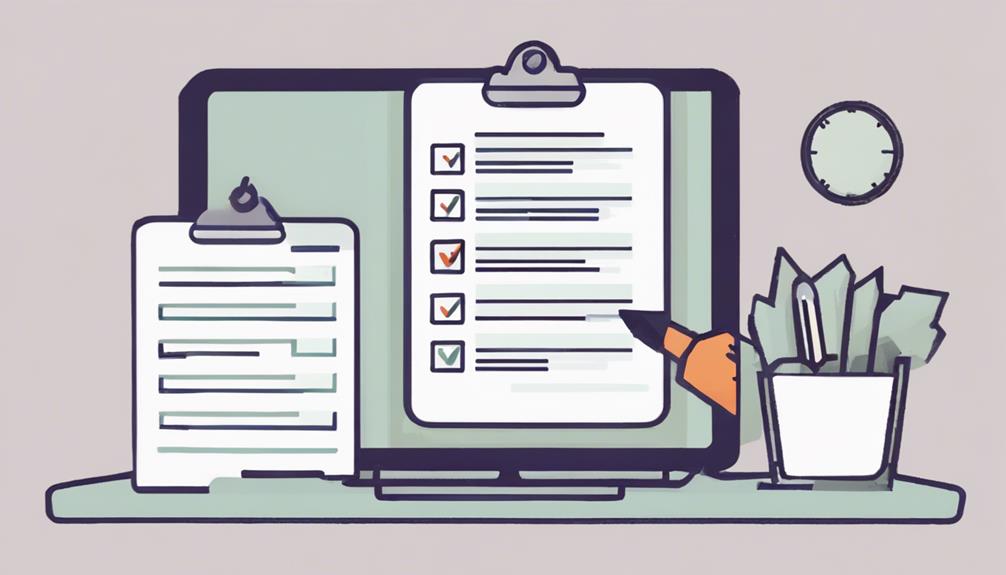Employing stringent vetting procedures is paramount for organizations, with DBS checks playing a crucial role in ensuring the safety and security of the workplace.
However, determining the eligibility criteria for conducting these checks can be a complex process for employers.
As various factors come into play, such as the nature of the role and the level of supervision involved, it is essential to navigate these guidelines meticulously.
Understanding the nuances of DBS eligibility can not only streamline the hiring process but also shield the organization from potential risks.
Key Takeaways
- Understand DBS check types based on role responsibilities.
- Adhere to legal requirements for requesting DBS checks.
- Register with DBS based on job role eligibility.
- Make informed decisions on candidate suitability using DBS check levels.
Types of DBS Checks for Employers
When assessing the suitability of candidates for different roles, employers can choose between Basic, Standard, or Enhanced DBS checks based on the level of risk associated with the position.
Basic DBS checks are suitable for roles that do not involve a high level of responsibility or contact with vulnerable individuals. Standard DBS checks are more comprehensive and are typically requested for positions that require regular contact with vulnerable groups, such as teachers or healthcare professionals.
Enhanced DBS checks, on the other hand, are necessary for roles with increased responsibility or positions where individuals are in a position of trust or authority over vulnerable individuals. Enhanced DBS checks with Barred List checks are particularly crucial for roles where individuals are barred from working with vulnerable groups, ensuring added protection for those in vulnerable circumstances.
Employers must carefully assess the specific duties and responsibilities of each role to determine the appropriate level of DBS check required to meet safeguarding requirements effectively. Understanding the distinctions between Basic, Standard, and Enhanced DBS checks empowers employers to make well-informed decisions regarding candidate suitability and safeguarding measures.
Employer Responsibilities for DBS Checks
Employers bear the responsibility of ensuring that job roles necessitating DBS checks align with the eligibility criteria for standard or enhanced checks. To fulfill this responsibility effectively, employers should:
- Understand the legal requirements surrounding the eligibility of roles for DBS checks.
- Request a DBS check only when permitted by law and necessary for the role.
- Select the appropriate workforce category – Child, Adult, or Other – when applying for a DBS check.
Registering as an Organization With DBS
Curious about the process of registering your organization with the Disclosure and Barring Service (DBS)?
To begin, it is essential to note that employers seeking to register with the DBS must be based in England or Wales for standard or enhanced DBS check applications. Utilizing the DBS eligibility tool, still in its beta phase for ongoing enhancements, aids in recognizing roles that qualify for DBS checks.
In instances where the tool does not encompass all roles or uncertainties persist regarding eligibility, contacting the DBS for additional advice is recommended.
Prior to commencing the registration process, it is crucial for employers to ensure that their job roles align with the eligibility criteria for standard or enhanced DBS checks. Registering as an organization with the DBS involves a thorough understanding and adherence to the eligibility requirements and guidelines, thereby facilitating a smooth application process.
Cost and Payment Methods for DBS Checks
When considering DBS checks, it is crucial to understand the breakdown of costs, available payment options, and the process for fee reimbursement.
Employers should be aware of the different fees associated with Basic, Standard, and Enhanced DBS checks and the payment methods accepted.
Additionally, understanding how to reclaim fees or seek reimbursement for DBS checks can help organizations manage their expenses efficiently.
Check Cost Breakdown
The breakdown of costs for DBS checks encompasses standard, enhanced, and enhanced with barred list checks, with corresponding fees of £23, £40, and £23, respectively.
Payment methods for DBS checks typically include debit or credit card payments online.
Employers can use a business account to pay for multiple DBS checks in a single transaction.
There are no additional fees for using the DBS online service to process payments.
Payment Options Available
To facilitate the payment process for DBS checks, employers have various cost-effective options and secure payment methods available. The cost of a Basic DBS Check is £23, payable online using a debit or credit card. For Standard and Enhanced DBS Checks, the cost varies, with Standard checks priced at £23 and Enhanced checks at £40.
Employers can streamline the payment process by setting up an online account with the DBS to pay for multiple checks in bulk. Accepted payment methods include credit and debit cards, BACS transfers, and cheque payments for organizations.
The DBS ensures a secure online payment system for efficient processing of payments for DBS checks, enabling employers to manage their checks conveniently and promptly.
Fee Reimbursement Process
For volunteers undergoing DBS checks, reimbursement for the associated fees can be requested through a specific process tailored to volunteer positions.
- Volunteers must follow the organization's guidelines to initiate the reimbursement process.
- Reimbursement is only applicable to volunteers and not to paid employees requiring DBS checks.
- Clear communication of reimbursement details is crucial to ensure volunteers understand the process.
Stages of the DBS Checking Process
Upon submission of an application for a DBS check, several key stages are initiated to verify the applicant's background and criminal record status. The process includes verifying the applicant's identity and cross-checking information against police and government databases.
Once the application is received, the Disclosure and Barring Service (DBS) undertakes thorough investigations to determine the individual's criminal record status. If any discrepancies or issues surface during the process, DBS may pause the application for further review and clarification.
It is crucial for applicants to provide precise and truthful information on their forms to facilitate a smooth and prompt checking process. DBS closely monitors the progress of applications and may request additional details if necessary for a comprehensive assessment.
Adhering to the guidelines and ensuring accuracy in the application can help streamline the DBS checking process and expedite the issuance of results for employers seeking to make informed hiring decisions.
Handling Disputes and Withdrawals
After completing the stages of the DBS checking process, employers may encounter situations where disputes or withdrawals need to be addressed promptly with the Disclosure and Barring Service (DBS).
When handling disputes and withdrawals, it is crucial to follow specific guidelines to ensure a smooth resolution process:
- Inform DBS Promptly: Any disputes regarding the DBS check levels should be communicated to the DBS immediately to initiate the review process.
- Cooperate with DBS Investigation: The DBS will investigate and review applications upon notification of a potential error in the check level applied for, requiring cooperation for a thorough assessment.
- Act Swiftly: Immediate notification to the DBS is essential as some applications can be processed within 48 hours, highlighting the need for prompt action to prevent delays in the hiring process.
Conclusion
In conclusion, employers must adhere to specific eligibility criteria when conducting DBS checks on their employees.
It is important to utilize the eligibility tool provided by the DBS, while also seeking advice directly from the organization for further guidance on eligible job roles.
Understanding the types of DBS checks, employer responsibilities, registration process, costs, and stages of the checking process are essential for ensuring compliance with DBS regulations.
Handling disputes and withdrawals effectively is also crucial in maintaining a reliable DBS checking process.



